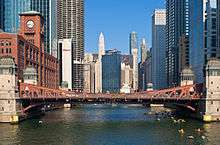La Salle Street Bridge (Chicago, Illinois)
The La Salle Street Bridge (officially the Marshall Suloway Bridge) is a single-deck double-leaf trunnion bascule bridge spanning the main stem of the Chicago River in Chicago, Illinois,[2] that connects the Near North Side with the Loop area. It was constructed in 1928 at a cost of $2,500,000[3] by the Strobel Steel Constructing Company.
La Salle Street Bridge | |
|---|---|
 View of the bridge from the Wells Street Bridge | |
| Coordinates | 41.887484°N 87.632474°W |
| Carries | Automobiles Pedestrians |
| Crosses | Chicago River |
| Locale | Chicago, Cook County, Illinois |
| Official name | La Salle Street Bridge |
| Other name(s) | Marshall Suloway Bridge |
| Maintained by | Chicago Department of Transportation |
| ID number | 000016603226800 |
| Characteristics | |
| Total length | 242 feet (74 m) |
| Width | 86 feet (26 m) |
| Longest span | 220 feet (67 m) |
| Clearance above | 18.7 feet (5.7 m) |
| History | |
| Designer | Donald Becker |
| Opened | 1928 |
| Statistics | |
| Daily traffic | 12050[1] |
%26groups%3D_148f67b5b03cc42386777fbd0bc9f189e7b7c84d.svg)
| |
The bridge was part of a scheme to widen LaSalle Street and improve access from the Loop to the north side of the river that had been proposed as early as 1902.[4] The design of the bridge, along with those for new bridges at Madison Street, Franklin Street, and Clark Street, was approved in 1916.[5]
The Chicago City Council renamed the bridge in 1999 to honor former Chicago Department of Public Works Commissioner Marshall Suloway.[6]
References
- "NBI Structure Number: 000016603226800". Retrieved 2013-01-05.
- "Chicago River Bascule Bridge, LaSalle Street". Historic American Engineering Record. Retrieved 2010-08-01.
- "Widening of LaSalle Street, New Bridge to be Ready by Nov. 1". Chicago Tribune. 1928-09-30.
- "La Salle Street Boulevard Plan". Chicago Daily Tribune. 1902-04-10.
- "Bridge Eyesores Will Give Way to Beauty Plans". Chicago Daily Tribune. 1916-02-18.
- Megan, Graydon (March 14, 2012). "Marshall Suloway, 1921–2012: Engineer with hand in expressways, O'Hare". The Chicago Tribune. Retrieved July 6, 2016.